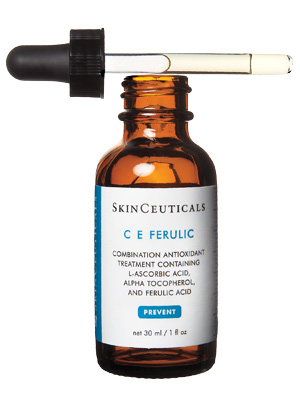Antioxidants seem to making their way into more and more skincare products and are becoming a integral part of any skincare regimen. “And why not?” claims Dr. Adam Mamelak, board-certified dermatologist at Sanova Dermatology. “Our skin cells are under a continual barrage of attack from free radicals.” These highly reactive molecules are generated from our cells’ normal metabolism, as well as a number of environmental insults such as UV, smoking and pollution. These molecules directly damage DNA, cell walls and other cellular structures the ‘age’ the skin. “Shouldn’t we look for ways to ward off these insults?”
“They’re one of my 3 R’s of maintaining healthy skin,” says Dr. Miriam Hanson, cosmetic dermatologist and skincare expert in Austin, Texas, “Reflect, Rebuild, and Restore!” Dr. Hanson purports that every skincare regimen should include a sunscreen to reflect damaging UV rays, a Vitamin A or retinol to rebuild collagen, and an antioxidant to restore the skin cells to their undamaged state.
So the obvious question: what are the best antioxidants for the skin? Check this out:
- Lycopene: Lycopene is the pigment that gives fruits and vegetables their unique colors. Lycopene is vital for photosynthesis. One of the unique features of lycopene is that it is able to seek out and nullify free radicals. This protects the organism – your skin – from the damaging effects of UV rays. This makes it an effective antioxidant for aging skin. Look for Lycopene in a number of skincare preparations, or as Dr. Hanson advises, “go straight to the source – eat grapefruit, papaya, and tomatoes for a natural source of good skin.”
- Carotenoids: Carotenoid is another powerful antioxidant that defends skin against radiation. “When the skin cells are exposed to radiation from the sun, it can potentially disturb the DNA, causing irregular growth that can eventually form into cancer,” claims Dr. Mamelak. When carotenoids are consumed, it helps prevent this. It is also known to reinforce arteries and help prevent the degeneration of the muscles in the eyes.
- Vitamin E: Vitamin E is an antioxidant that is found on the skin and also in many vegetables and meat sources. It naturally boosts collagen production, resulting in less noticeable fine lines and age spots typical of aging skin. “Vitamin E is effective when consumed in the forms of fruits and vegetables, or when applied directly to the skin,” notes Dr. Hanson. Most skin care products market two forms of vitamin E: alcohol based or non-alcohol based vitamin E. The alcohol base vitamin E tends to be absorbed more easily by the skin.
- Resveratrol: Coffee berry is a relative new comer to the skin care industry. Coffee berry is known to prevent collagen damage, as well as protect the skin against external aggressors. Coffee berry has anti-inflammatory properties, making it ideal for individuals suffering from eczema or rosacea. Resveratrol is the active compound that helps nullify oxidative stress on the skin.

- Vitamin C: Vitamin C is also a powerful antioxidant. Vitamin C is synonymous with people suffering from a cold or a runny nose – but it has also been heralded as an effective treatment for dull, congested skin due to its mild exfoliating properties. Vitamin C implements a two way approach when preventing skin ailments. “It is an antioxidant as well as a known medium in boosting collagen production,” explains Dr. Hanson. “But vitamin C is also an effective antioxidant when it comes to maintaining the skin’s appearance.”
- Ferulic Acid: This natural component of plant cell walls is considered one of the most potent antioxidants in nature. It’s addition to skincare products came after demonstrating how well it protected skin cells from harmful UV solar radiation. “In fact, exposure to UV light actually increases its anti-oxidant properties,” claims Dr. Hanson. For the best natural sources of Ferulic Acid, try brown rice, whole wheat, oats, coffee, apples, artichokes, peanuts, oranges and pineapple.
- Epigallocatechin gallate (EGCG): “It’s a mouthful, which is why I usually call it green tea!” says Dr. Mamelak. Beyond skincare, research has looked at using EGCE for a number of medical conditions, form infectious disease to cancer prevention. A potent antioxidant, It has also been found to inhibit the growth of a number of cancers and exert similar effects to some anti-cancer drugs.
There are many runners up. We can’t forget about broccoli, goji berries, blueberries and others. The truth is, new antioxidants are being identified everyday, and their health and skin benefits continue to be characterized.
Contact Us
To learn more about how antioxidants can take your skin care to the next level, or to schedule a consultation with one of our dermatologists to help individualize the perfect skincare regimen for you, contact us at Sanova Dermatology today.
